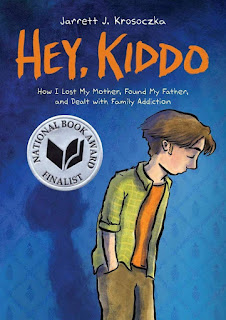First, I admit it.
I had an advanced copy of Nic Stone's
Clean Getaway, but got side-tracked over the last few months with piles of other books (too often academic ones). Yet, earlier this month, when I was fortunate to read a copy of
Dear Justyce (it comes out next fall), my love of her storytelling came back full force. I knew I needed more Nic Stone, so I flipped my house apart looking for
Clean Getaway to bring with me to NCTEAR (National Council of Teachers of English Assembly for Research) so I could read the book on the plane to Nashville. I decided that since I'm an Aquarian and celebrated my 48th year on the 16th, I deserved to give myself a birthday present.
Clean Getaway was a cherry for the February cupcake.
When I got home from Nashville, I strategically positioned Nic Stone's book next to my figurine of an adult frog who is reading to a younger frog (ribbit ribbit - a gift from Dr. Susan James) and in front of one of my Buddhas - this is what I've been thinking about since I finished reading..
I am a lover of eccentric grandmother stories. I was raised by one who lived in Hamilton, New York, and, well,
Harold & Maude continues to be one of my favorite movies of all time (no, Ruth Gordon wasn't a grandmother, but was a grandmother's age when Harold fell in love with her)(& yes, the Cat Stevens' soundtrack is still astounding)(& no, my grandmother never took me on a road trip - she never got a license drive - but she did worship the trees and steal water pitchers and silverware from Chuck E. Cheese under her coat).
My grandmother was an absolute trip (pun intended?), and I never knew what was going to happen when we visited. I suppose her frog-love became my frog-love and when Dr. Susan James sent me the reading frogs they quickly moved to my mantle of LOVE. Memories of my grandmother bring me peace of mind. They always bring me a smile. Grannie Annie was the woman who would charge into the bathroom after we showered to take photos of us and the woman who sculpted Feen-a-ment laxative gum into beds of roses on the back of her toilet.
It was probably a good thing she didn't drive...the roads of upstate NY couldn't handle it.
At Grannie Annie's camp I read
Miss Twiggley's Tree over and over again until I had it practically memorized. The story of an eccentric woman not conforming to society's standards has been with me since the beginning. Who wouldn't want to live with bears and dogs and cats up in a tree?
That is a Scoob - G'ma philosophy!
Written for middle school youth,
Clean Getaway brought me back to my 5th-7th grade days, where I first tasted chapter books, and suddenly sought more stories about kid experiences. Obviously Roald Dahl was an influence at the time and all the girls read Judy Bloom (note: when the boys stole those books and read them, we never got them. Well, I guess I always related to
Blubber.
At that age, however, I was in a hunt for stories that would interest me. There weren't many, and that is why I'm glad there's a boom in the young adult literature world right now (Thanks, Penguin Random House Children's Books - The kids today are so lucky).
I'm not revisiting the plot of
Clean Getaway here, nor will I offer a critique or review. Instead, I''m simply doing a daily thought and it happens to be on Nic Stone's book
, because it took me back to my youth. The middle school years are always a time where life depends on the whims and fancies of adults. Privacy is difficult, if not impossible, to come by. Yet, the first stages of figuring out the world and a place in it begins.
Scoob's G'ma gets away with a lot in her life - perhaps too much - but he has a tremendous connection with her.
Clean Getaway is a story about love, not only for his grandmother, but that he has for his father, too. More importantly, along the way, Scoob is educated about Civil Rights throughout Georgia, Mississippi, Alabama, Louisiana, and Texas. On a map he doodles his experiences, and from road-tripping along his grandmother's memories, Scoob also locates himself along a racial, historical timeline.
It's hard for me to believe that until 1967, Black and Brown individuals who were in love with White and Cream individuals (vice versa with that love, too) were forbidden to marry. I was born five years later. Such disparity and history are woven into the fabric of the United States, and becomes an imprint on Scoob's mind, too. William "Scoob" Lamar learns this from his grandmother as she takes him on the road trip of his life, that skin color has always marked opportunities in good and bad ways. Life has been harsher for those with darker tones. G'ma, a White grandmother, saw it as a young woman and now, as an elderly woman, is doing one last run to make sense of her life.
As a result, Scoob goes full circle between having forgiveness for the mischief G'ma took part in throughout her life and justice, which didn't serve his grandfather well, and that he hates from a caring, but disciplined father. As I read, I wondered if middle school students would do the same. Where would they locate themselves within the rules of society, their parents, and friends? What would they think about wrong and right? Punishments? Fairness? and Love of Family?
Oh, G'ma. Grannie Annie. Maude. Oh, Scoob. You got me thinking.
That so few now dare to be eccentric marks the chief danger of the time - John Stuart Mill
LOVED THIS BOOK. Loved reading
Dear Justyce, too - but I'll write about that some other time.
For now, I'm simply posting in appreciation of Nic Stone's writing. I can't wait to learn how middle school teachers find success teaching Scoob's story!






































